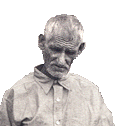The Uncle For Whom Time Stood Still
Lewis C. Thomas
by Glenn Twist
c.1937

The world was little touched by Uncle Lewis' presence. Nonetheless, for the sort of life he lived, he is worth remembering by his people, at least, [those] who today live in a society that speaks of "safety nets", social security, Medicare and pension plans. I saw Uncle Lewis just once, in 1932 -- give or take a year or two. He lived to be 91 years of age, more than half of that isolated from the rest of the world on top of Black Mountain. Today, independent and self-sufficient people who live in the mountains are called survivalists.
To outsiders, Uncle Lewis' survival would appear to be at the miserable level endured by early l9th Century mountain people who cut themselves off from the rest of the world when they settled deep in the Appalachian mountains of Eastern Kentucky. In this situation, however, the very word miserable has to be considered to have meaning that is both broad and relative. While the quality of this family's life would be absolutely unacceptable to people living in our super-market society, it might appear to people living elsewhere in the world, who accept starvation as a daily occurrence, as an overflowing cornucopia.
As if my only visit with Uncle Lewis was only yesterday, I can still see the milk and butter that Josie, his second wlfe, had stored in their spring house. Of course I now know that spring water isn't likely to be cold enough to safely refrigerate milk products. That knowledge, however, does not detract one whit from my nostalgic memory of the cold buttermilk that I drank that day. I still think it humorous that Uncle Lewis would be unhappy because a new Forest Service road was to pass near his home. Most clearly of all, however, I see the blacksmith's forge, complete with an oversize leather bellows, that he had built right in his home. I have since learned that both Uncle Lewis and his son, Hugh, were known locally as outstanding sorghum makers. I presume that the forge was necessary to make and maintain his cane press and cooking vats and that his small need for cash and barter goods was filled by smithy work and the sale of sorghum syrup.
Susie, Lewis' first wife, four infants and a child, as well as her father, James Stephens are all buried in the cemetery on Hawkins Flat. The rest of his family is buried in cemeteries having easier access. From this, I gathered that Lewis' family lived with his widowed mother -- he was only a year old when his father was murdered by "Backshooters" -- until after Susie's death.
Often, in the fifty years that have passed since I saw Uncle Lewis I have asked myself if I could have done as well in his circumstances. Yes, and I also have regretted not [to] have asked him to show me his coonskin cap and long-barreled. Surely, he must have had both.